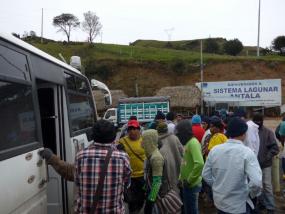In Colombia, on the evening of 28th May, peaceful protestors allied with the Congreso de los Pueblos (The Congress of the Peoples is a social and political movement born out of the “La Minga” indigenous mobilizations of 2008. The movement achieved national scope and was joined by students, workers, women, peasants, Afro-Colombians, community groups, and other sectors of society), were threatened with arson and physical violence by local police on their way to joining the national strike called for the 30th May. Police intercepted the bus carrying the protestors to the town of Berlín in Colombia's Centro Oriente region, initially illegally demanding the details of the driver. The driver later received an anonymous call alleging that the bus would be burnt if it carried on to the village. Later another police officer boarded the bus claiming that locals would assault the vehicle with rocks if they continued, despite a meeting between protestors and the local community already having been scheduled for the the next day. Later, five kilometres from Berlín, the bus was stopped and surrounded by around 40 armed police officers. In response, the protestors later retreated to a small roadside town nearby, where a camp of around 300 people has been set up with the permission of the local community. The protestors back a set of national demands for the rights of local communities to be respected faced with a government-sponsored model of development that favours multinational companies over peasant, indigenous and afro-descendants groups in particular. In particular in the Santander region, they oppose the government's granting of mining rights to companies looking to exploit the area's paramos, plains supposedly protected by national environmental law. In addition, they are seeking recognition of local land rights faced with the ZIDRES law, designed to smooth the path for companies to expropriate holdings for monoculture or mineral extraction.
